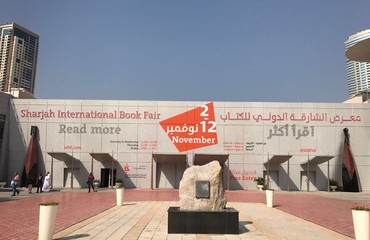São Paulo – Two days before the opening of the Sharjah International Book Fair (SIBF), the book fair held every year in Sharjah, United Arab Emirates, an event called SIBF Professional Program, with matchmaking sessions with publishers from all around the world, takes place. From the 207 participants in the 2016 edition, only one was Brazilian: Luiz Álvaro Salles Aguiar de Menezes, foreign affairs manager of the Brazilian Book Chamber (CBL, in the Portuguese acronym) and head of the Brazilian Publishers project, a partnership with the Brazilian Trade and Investments Promotion Agency (Apex-Brasil).
He was the only representative in the event from Latin America and Portuguese-speaking countries. His presence, however, was not without a purpose: the choice of Sharjah as guest of honor of the 25th São Paulo International Book Biennial in 2018. “The invitation came from the Sharjah Book Fair. There’s a desire to bring the Brazilian and Arab publishing markets closer,” Menezes told ANBA.
The Arab publishing market is large and still untapped by Brazilian writers and publishers. The Sharjah book fair welcomed more than 2 million people, the majority of them Arabs. According to the CBL’s manager, around 80% of the books sold in the event, which focus on the end consumer, are available in Arabic and in English. He didn’t find any books from Brazil.
This doesn’t mean there’s no interest in Brazilian literature. To the contrary: according to Menezes, children and teenagers’ books and novels from Brazilian authors attracted the attention of a couple of Arab publishing companies. “They have USD 350,000 available for translation grants to encourage the exchange of copyrights,” says the manager.
The grants for translation work like this: the money is offered by the fair to the publishing company taking part in the SIBF Professional Program. Then, the publishing companies select the works that drew their attention and use the resources to hire a translator so the work can be made available in the local language.
“Fifteen Brazilian works were registered for the grant. There are no closed deals just yet, neither with Brazilian nor with publishing companies from other countries, which is something that should happen only in a couple of months,” says Menezes, who believes there are a good chance for businesses with some children’s books: “The drawings and illustrations are very colorful, and this is appealing to them.”
In the end, a delegation from the Emirates Publisher Association (EPA), one of the Sharjah fair’s organizer, should come to Brazil again in the first half of 2017 – they were here between August and September of this year for a first contact. In the second half of the year, a delegation of Brazilian publishers will visit the Arab fair, which lasts ten days and always starts on November’s first Wednesday.
“This year, Brazilian chef Morena Leite took part in the fair,” says Menezes. The chef, owner of restaurants Capim Santo and Santinho, in the the city of São Paulo, took part in the cultural schedule and cooked for three consecutive days in the fair. Her recipes, inspired by Brazilian cuisine, pleased the Arabs. Now, it could be the books’ turn to do the same.
*Translated by Sérgio Kakitani




